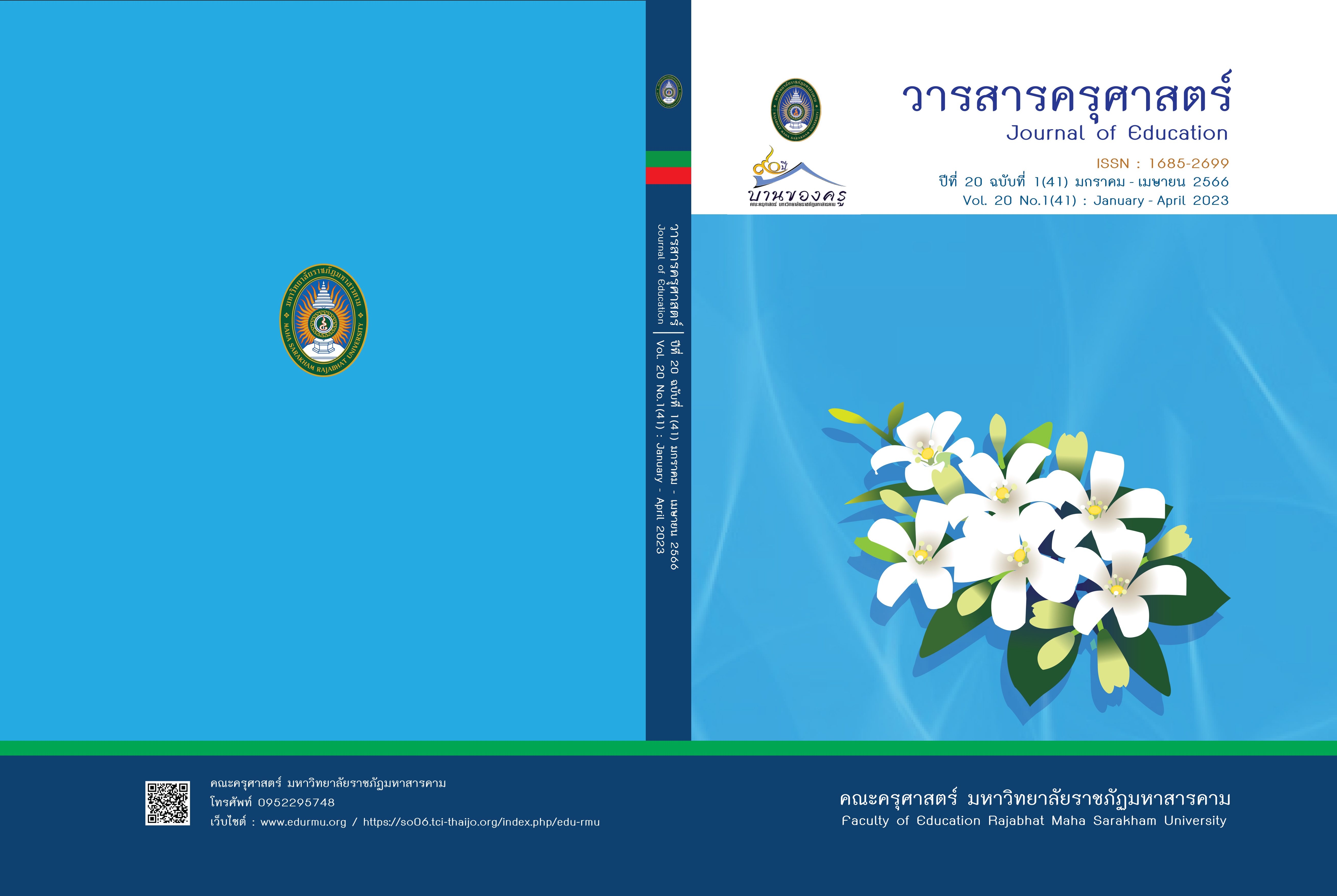The Components and Indicators in Administrator Competency of Science Mathematics and Technology Quality Secondary School Under Office of the Basic Education Commission
Main Article Content
Abstract
The purpose of this research was to study the components and competency indicators for the Administrators of Science Mathematics and Technology Quality Secondary School under Office of the Basic Education Commission. The population used in this research were: Qualified persons in educational administration who have been selected 25 people with a specific form data were collected using the following tools: 1) Data recording form for relevant content analysis 2) Interviewing 7 experts using an interview and 3) The collection of opinions of 18 experts by using a questionnaire. The results of the research revealed that the components and indicators consists of 7 Components: 1) Organizational Leadership composed of 3 indicators 2) Strategic Management composed of 3 indicators 3) Academic Leadership composed of 4 indicators 4) Achievement Oriented composed of 5 indicators 5) Teacher Development consisted of 3 indicators 6) Learner development consisted of 3 indicators and 7) Communication consisted of 3 indicators. Which were behavioral attributes resulting from knowledge skills and attributes of persons can be measured and observed by school administrators used in management to develop potential for learning skills in science mathematics and technology learner.
Article Details

This work is licensed under a Creative Commons Attribution-NonCommercial-NoDerivatives 4.0 International License.
ข้อกำหนดเบื้องต้นที่ผู้นิพนธ์(ผู้ส่งบทความ) ควรทราบ
1. ผู้นิพนธ์ที่ประสงค์จะลงตีพิมพ์บทความกับวารสาร ตั้งแต่เดือนมกราคม 2563 เป็นต้นไป ให้ใช้รูปแบบใหม่ (Template 2563) โดยสามารถดูตัวอย่างได้ที่เมนู GUIDELINES
2. จะตีพิมพ์และเผยแพร่ได้ ต้องผ่านการประเมินจากผู้ทรงคุณวุฒิ (Peer Review)
3. การประเมินบทความโดยผู้ทรงคุณวุฒิ (Peer Review) เป็นแบบ Double Blind
4. การอ้างอิงบทความใช้หลักเกณฑ์ APA (American Psychological Association) คลิก
5. บทความถูกปฏิเสธการตีพิมพ์ ไม่ผ่านการประเมิน ผู้นิพนธ์ขอยกเลิกเองหรือชำระเงินก่อนได้รับการอนุมัติ ทางวารสารไม่มีนโยบายการคืนเงิน
References
กมลา รักษ์วงศ์. (2562). การพัฒนารูปแบบการบริหารจัดการเพื่อส่งเสริมคุณภาพโรงเรียนวิทยาศาสตร์ ระดับมัธยมศึกษาในประเทศไทย. ดุษฎีนิพนธ์ ปรัชญาดุษฎีบัณฑิต. ชลบุรี: มหาวิทยาลัยบูรพา.
กาญจนา แสงสารพันธ์. (2562). การพัฒนาตัวบ่งชี้สมรรถนะภาวะผู้นำทางวิชาการของผู้บริหารโรงเรียน มัธยมศึกษา สังกัดสำนักงานคณะกรรมการการศึกษาขั้นพื้นฐาน. ดุษฎีนิพนธ์ปรัชญาดุษฎีบัณฑิต. ชลบุรี: มหาวิทยาลัยบูรพา.
ฉัตรชัย นาถ่ำพลอย. (2562). การบริหารแบบมุ่งผลสัมฤทธิ์ในสังคมปัจจุบัน. วารสารนวัตกรรมทางการศึกษาและการวิจัย, (3)3, 171-178.
นริศ มหาพรหมวัน. (2561). รูปแบบสมรรถนะผู้นำโรงเรียนเอกชนสู่มาตรฐานสากล. ดุษฎีนิพนธ์ปรัชญาดุษฎีบัณฑิต. เชียงใหม่: มหาวิทยาลัยราชภัฏเชียงใหม่.
นฤมล พันลุตัน. (2560). รูปแบบการพัฒนาสมรรถนะผู้บริหารสถานศึกษาขั้นพื้นฐาน เพื่อรองรับการเป็นประชาคมอาเซียน. ดุษฎีนิพนธ์ครุศาสตรดุษฎีบัณฑิต. เชียงราย: มหาวิทยาลัยราชภัฏเชียงราย.
นรเศรษฐ์ ชุมวงศ์. (2563). รูปแบบการบริหารเชิงกลยุทธ์โรงเรียนเอกชน สังกัดสำนักงานคณะกรรมการ ส่งเสริมการศึกษาเอกชนในจังหวัดนนทบุรี. วารสารมนุษยศาสตร์และสังคมศาสตร์ มหาวิทยาลัย
ราชพฤกษ์, 6(3), 91-108.
ปฐมสุข สีลาดเลา. (2560). การพัฒนาตัวบ่งชี้สมรรถนะของผู้บริหารสถานศึกษาขั้นพื้นฐาน. ดุษฎีนิพนธ์ ปรัชญาดุษฎีบัณฑิต. ชลบุรี: มหาวิทยาลัยบูรพา.
ภิชาพัชญ์ โหนา. (2562). รูปแบบการพัฒนาสมรรถนะผู้บริหารสถานศึกษาในยุคประเทศไทย 4.0. ดุษฎีนิพนธ์ ครุศาสตรดุษฎีบัณฑิต. นครสวรรค์: มหาวิทยาลัยราชภัฏนครสวรรค์.
เยี่ยมลักษณ์ เอี่ยมศิริ. (2562). รูปแบบการบริหารแบบมีส่วนร่วมในการพัฒนาจิตลักษณะทางวิทยาศาสตร์ ของนักเรียนที่มีความสามารถพิเศษโรงเรียนจุฬาภรณราชวิทยาลัยเลย. วารสารการบริหารการศึกษา และภาวะผู้นำ มหาวิทยาลัยราชภัฎสกลนคร, 5(20), 242-252.
สถาบันทดสอบทางการศึกษา. (2564). สรุปผลการทดสอบทางการศึกษาระดับชาติขั้นพื้นฐาน ปีการศึกษา 2563. กรุงเทพฯ: สถาบันทดสอบทางการศึกษาแห่งชาติ (องค์การมหาชน). สืบค้นเมื่อ 19 ธันวาคม 2565, จาก https://www.niets.or.th/th/content/view/22417.
สถาบันส่งเสริมการสอนวิทยาศาสตร์และเทคโนโลยี. (2560). คู่มือโครงการโรงเรียนคุณภาพวิทยาศาสตร์ คณิตศาสตร์และเทคโนโลยีตามมาตรฐาน สสวท. กรุงเทพฯ: สถาบัน.
สุวิมล ว่องวาณิช. (2548). การวิจัยประเมินความต้องการจำเป็น. กรุงเทพฯ: สำนักพิมพ์ธรรมดาเพรส.
สำนักงานเลขาธิการสภาการศึกษา. (2554). การขับดันระบบเศรษฐกิจฐานความรู้ด้วยกำลังคนระดับสูงที่มี ความสามารถพิเศษด้านวิทยาศาสตร์และเทคโนโลยี. กรุงเทพฯ: พริกหวานกราฟฟิค.
อัญชลี บุญมี. (2561). คุณธรรม จริยธรรมสำหรับผู้บริหารที่สอดคล้องกับการปกครองในองค์กรภาครัฐ. Veridian E-Journal,Silpakorn University, 11(3), 1339.
Gibson, J.T., Ivancevich, J.M., & Donnelly, J.H. (1997). Organizational : Structure, process, behavior. Texas: Business Publications.


